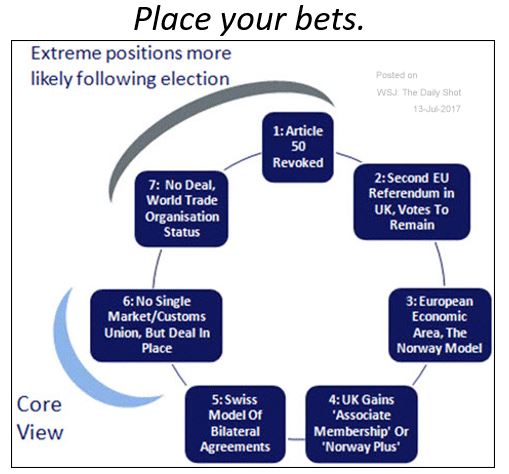
Napoleon famously said that one should not interrupt an opponent who is making a mistake. This may only be the case when one opponent is making the mistake that the other opponent anticipates and/or desires. When one party reacts in an undesired way, however, the mistake may rebound with unpleasant consequences on the other. The EU Brexit negotiation team must be watching the mistakes being made by their UK counterparts with a mixture satisfaction and alarm. The UK's flawed preparations for the Brexit negotiations have weakened its position, but may not necessarily have strengthened the position of the EU by the same degree. Estimating the probabilities of the potential outcomes in view of this negotiating dynamic is all-the-more complicated. Consensus is building that the more extreme outcomes are now probable as a result of the UK’s behavior.

(Source: The Daily Shot)
In the last report, it was suggested that the EU Brexit negotiating team would seize the initiative after Theresa May’s sub optimal general election outcome; and inflict a strategic defeat on Britain by forcing it to negotiate on EU terms. First blood was promptly drawn by the EU on the first day of the negotiations when Britain was forced to concede that it must first negotiate the exit settlement bill before then negotiating a trade deal with the EU.
EU chief negotiator Michel Barnier lined up a further attempt to control this two-stage process by warning that the exit bill will be “substantial”. Britain must now evaluate a bill expected to be 50+ Billion Euros with no guarantee of favorable trade terms after it has paid. Prime Minister Theresa May then conceded further ground by offering to safeguard the rights of a selecting number of EU citizens remaining in Britain, but even this was greeted with initial suspicion by the EU.
This offer of a concession could also prove to be fatal for May, as a new rumor claims that she was the only cabinet member in opposition to safeguarding EU citizens’ rights when this was first proposed by former Prime Minister Cameron. If this rumor proves to be true, her ability to negotiate in good faith with the EU will be impaired; whilst her integrity and credibility will be destroyed by this latest U-turn against her original conviction. After making the required derisory noises, the EU came back with demands for a better deal for all of its citizens and less ambiguous wording about their fate at the hands of the British government. If May capitulates further she risks looking like a hypocrite, but if she does not compromise she risks not getting any deal done. Either way, she cannot win, so her position is tenuous at best and untenable at worst.
The EU waited until the dust of recent G20 meeting had settled before officially responding to May’s offer to its citizens. The response was a bombshell when it was delivered in OpEd-form by Guy Verhofstadt directly to the British people, rather than confidentially to May’s team. The EU has already decided that May and her government are not rational actors and are in fact politically dead in any case. Addressing the British public, Verhofstadt opined that the offer was derisory; and afforded EU citizens a “second class” status that was in effect far worse than what was offered in the original Brexit referendum plan offered by David Cameron. The EU’s legal institutions will, therefore, reserve the right to opine and also to rule on the treatment of its citizens going forward. In effect, the EU does not recognize the sovereignty and legitimacy of the British Parliament and its legal system. May was thus told to improve her terms or face no deal. This lack of recognition of British sovereignty is exactly the issue that motivates the Leave vote, so the EU has effectively nudged the process closer to either a no deal or Hard Brexit outcome.
In recognition of her precarious position, the Prime Minister then took another ill-judged gamble to secure her position. This latest speculative move involves an offer to let the opposition Labour party have more say in policy making in relation to the post- Brexit aftermath. Having given Labour the edge by calling an early election, which has led to her current predicament, she has now compounded her mistake by increasing this edge. Labour will frame this as a strategic defeat and a recognition that it is now the natural party of government post-Brexit. It may even push for elections to come earlier to give it the mandate to influence the Brexit negotiations themselves. No doubt the party will campaign on a platform to take Britain straight back into the EU.
The initial response of Labour was to reach out to dissident Conservative MP’s who share similar views, rather than to embrace May’s offer, in order to draft shadow-legislation that will negate the very Brexit withdrawal bill that the Prime Minister will submit to Parliament for its vote. This initial Labour response was then followed by a direct unilateral attack on Theresa May’s proposed Brexit legislation dubbed the “repeal bill”. Acting as Labour Party spokesman, Shadow Brexit Secretary Kier Starmer demanded immediate changes to the bill with the threat to vote against it in its current proposed form. There is, therefore, a move to defeat May’s bill, by amending it, even before it has been written and presented to Parliament.
Britain could thus find itself swiftly back in the EU and the Conservative Party could end up in the political wilderness. The return to the EU fold would, however, come after the ritual shaming and expense of undergoing some form of Brexit process; in order for the EU to assert its authority and frighten other would-be leavers. There would then be the matter of the new joining fee and terms and conditions since the EU that Britain is Brexiting is transitioning to be something quite different in the future. Nothing short of British unconditional surrender will suffice for the EU Project.
Britain now faces the risk of being on the hook for the heavy final settlement bill, even if it then fails to get a trade agreement agreed. Barnier’s framing of the process as “substantial” implies that the terms of the trade deal offered by the EU will not be to Britain’s liking; and that it will be given an ultimatum to take it or leave it, despite the EU saying that this process is not about punishment or revenge. The British negotiators who accept the settlement deal and then deliver a trade agreement that is not favorable to Britain will face the punishment and revenge of the fickle British voters who have so far shown that they want their cake and eat it. British Foreign Secretary Boris Johnson reacted to the “substantial” threat by telling Mr. Barnier to “go whistle”. Mr. Barnier however only hears the sound of a “clock ticking” on Britain’s continued failure to come up with a cogent negotiating offer of its pre-conditions to fully enter Brexit talks, even though the end date for British EU membership has been established.
Some clarity on the British position was provided by a member of its unelected House of Lords. Joyce Hanelay a Brexit Minister for the Upper House stated clearly that “The government recognizes that the U.K. has obligations to the EU, and the EU obligations to the U.K., that will survive the U.K.’s withdrawal and that these need to be resolved.” This view was taken as a signal that the government in principle is comfortable with a settlement bill somewhere in the 50 Billion Euro ballpark. This position only reflects the view of how the Lords will opine; but it does not clearly explain what the elected government, with its tenuous majority, will offer. All it therefore shows is that the Lords are in favor of a Soft Brexit. It does not guarantee that the government will deliver this outcome.
Britain is precluded from signing free trade deals with other nations until it has formally left the EU in 2019. A gap, therefore, exists in time, in which potentially there is no clarity as to Britain’s future trading prospects. To fill this gap and also to restore some kind of negotiating balance with the EU, Britain began initial free trade talks with America. Unfortunately, Britain has a £48 Billion trade surplus with America and President Trump will not like this. The allure and potential salvation of a free trade deal with the US should therefore not be overestimated by Britain. In practice, the free trade deal may rebalance the terms of trade in America’s favor.
Whilst Britain’s negotiating team were unable to find a consensus position within their own group, on how they should proceed, the EU continued to forge ahead and set the agenda in the “substantial” frame of reference earlier signaled by Michel Barnier. It is clear that the EU is setting out its stall to prepare for three possible outcomes in which Britain either capitulates, negotiates aggressively or walks away with no deal. To preclude the latter, Barnier opined that whilst this outcome is bad for both sides, in fact, it is worse for Britain. He also made it abundantly clear that, even in the aggressively negotiated outcome, Britain will not get the benefits of frictionless trade post-Brexit. By inference, it, therefore, seems likely that there will not be any frictionless trade even if Britain capitulates. The EU is converging on the aggressively negotiated outcome. Britain will clearly not capitulate if May remains Prime Minister; so it is either converging on this same aggressive negotiated outcome or the no deal outcome if it decides to call the EU’s bluff.
There had been hope in Britain that German industry, with its eyes on British consumers of its exports, would rally in support of its export partner to bring pressure for a softer Brexit deal. German industry has fallen into line with the EU position and recently informed its British trade partners that its priority is to preserve the single market for the remaining 27 nations. Political and economic interest within the EU to punish Britain, now appear to be in perfect alignment.
As the Brexit negotiations began, the degree of disarray within the British team became evident. Lead negotiator David Davis is at odds with Theresa May over EU citizens’ rights. Davis wishes to provide a unilateral and universal guarantee that will apply to all EU citizens in the UK. May prefers to pick and choose how to treat EU citizens based upon how long they have resided in the UK. Davis’s position looks to be more in line with the EU’s perception of how its citizens should be treated. Davis is a pro-Leave campaign veteran, so his position, therefore, makes Theresa May look even more extreme. There is also discord within Team UK on the critical transition period before Britain formally exits the EU. Chancellor Philip Hammond would like a two year phased transition period to avoid shock therapy to the UK economy. UK Trade Secretary Liam Fox prefers the shock treatment of a swift transition.
Faced with a divided UK negotiating team, the EU team quickly moved from exasperation to frustration. This frustration is leading the EU to the swift conclusion that it may be optimal for it to drive the process more assertively. Any such move would then raise the probability of either a Hard Brexit or a no deal outcome.

In preparation for judgment day with the voters, the Conservative Party is rumored to be preparing Chancellor Philip Hammond to act as a caretaker through the Brexit process; but ultimately to hand power over to a new younger generation of Conservative leaders to fight for the future of the party and the nation. The Labour Party meanwhile has its own agenda for the nation’s youth, which it intends to lead with the current middle-aged leader after his youthful bona fides have been burnished by his appearances at rock festivals and other cool venues.
Evidently, it is time for the Conservatives to ditch those policy makers associated with the Brexit debacle and swiftly move on. As the party begins the process of creative political destruction, its focus and ability to behave as a rational actor in the Brexit negotiations will be further undermined. The Labour Party, on the other hand, will encourage and contribute to this destruction, even at the expense of a resulting Hard Brexit or no deal outcome. In fact, it is in Labour’s interest to have the worst possible outcome so that it can win the next election. The Brexit negotiations may, in fact, get framed in terms of the political dialectic within the Conservative Party and the nation at large, rather than as the discrete event that is the most important thing to happen to the lives of Britons since Britain joined the EU. This subsuming of the Brexit negotiations, into the narrower struggle over national governance, raises the probability of both the Hard Brexit or no agreement outcome significantly.



